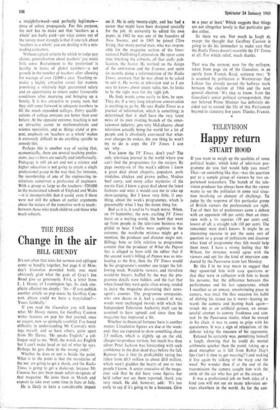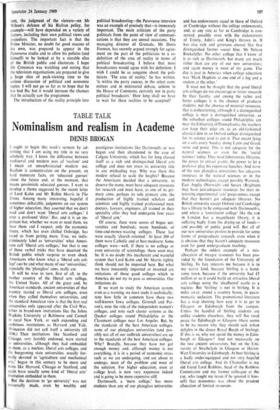Happy return
TELEVISION STUART HOOD
If you want to weigh up the qualities of some political leader, which kind of television pro- gramme do you feel would help you most? That—or something like that—was the question put to a sample group of viewers by two ex- perienced researchers. The hunch of the tele- vision producer has always been that the viewer wants to see the politician in some real situa- tion involving an element of challenge. To judge by the response of this particular group of British viewers the professionals are right. Top of their list of preferences came a debate with an opponent (48 per cent), then an inter- view with a TV reporter (39 per cent) and, lowest of all, a straight talk (10 per cent). The remainder were don't knows. It might be an interesting exercise to put the same sort of question to a group of politicians and discover what kind of programme they felt would help them most. I have a strong feeling that Mr Wilson, for instance, would agree with the viewers and opt for the kind of interview con- ducted by the Panorama team last Monday.
By this I in no way mean to suggest that they spoon-fed him with easy questions or that they were in collusion with him to boost his persona; but the difference between this performance and his last appearance, which I recollect as an uneasy, unconvincing piece to camera, was total. On that occasion his habit of shifting his stance (as it were)—leaning to- wards the camera and leaning back again— struck me as an artificial gesture, an unsuc- cessful attempt to convey frankness and con- trol. In the Panorama studio, when he moved in his chair, it was to come to grips with his questioners. It was a sign of relaxation, of the debater taking the measure of his opponents..
Relaxed he certainly was, permitting himself a laugh, showing that he could do mental arithmetic quicker than the panel, taking up a dead metaphor as it fell from Robin Day's lips (`isn't it time to get weaving?') and making • it live again by talking of the warp and the woof. No wonder then if at the end of the transmission the camera caught him with the smile of the cat who has got at the cream.
It was a professional job on both sides, of a kind you will not see on many television ser- vices elsewhere in the world. As for the con- tent, the judgment of the viewers—on Mr Wilson's defence of his Biafran policy, for example—will have depended on a variety of factors, including their own political views and prejudices. The important fact is that the Prime Minister, no doubt for good reasons of his own, was prepared to appear in the Panorama studio and to allow his policies (and himself) to be looked at by a sizeable slice of the British public and electorate. I hope Mr Crossman was watching and noting that the television organisations are prepared to give a large slice of peak-viewing time to the serious discussion of political and economic topics. I will not go so far as to hope that he has had flu; but it would increase the chances that he actually saw the programme.
The introduction of the reality principle into political broadcasting—the Panorama interview was an example of precisely that—is immensely important. The main criticism of the party politicals from the point of view of communi- cations is that they are unreal occasions. The managing director of Granada, Mr Denis Forman, has recently argued strongly for agree- ment on the part of the politicians to a re- definition of the area of reality in terms of political broadcasting. I believe that most broadcasters would agree with his definition; I wish I could be as sanguine about the poli- ticians. The area of reality,' he has written, 'is within the party caucus, in the select com- mittees and in ministerial debate, seldom in the House of Commons, certainly not in party political broadcasts.' How long shall we have to wait for these realities to be accepted?



































 Previous page
Previous page